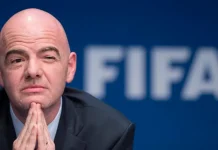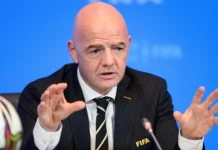As the 2026 world cup qualification campaign begins to reach its final stage, Argentina, world champions and cultural football giants find themselves in a hot global governance scandal.
In August 2025, FIFA penalized the Argentine national team with a series of disciplinary measures due to a number of cases regarding fan violence, security violations, and player conduct during important qualifiers. These accidents happened to Argentina in its domestic matches with Colombia and Chile, two highly charged game events that pitted fan blocs and bitter regional animosity against each other.
The punitive action also involves fines amounting to 146,000 Swiss francs, partial stadium ban, which downgrades capacity by a quarter, on Argentina’s last home qualifier, and a two-match suspension on a midfielder, Enzo Fernandez, due to unsporting behavior. The financial, infrastructural and personnel sanctions combined indicate FIFA not only to punish, but also to instill a hindrance based on the shifting global standards within the organization in terms of compliance.
Standards of conduct: order, respect, and fair play
The disciplinary measure imposed in Argentina is based on the FIFA disciplinary code, especially the Articles 14, 15, and 17, that concerns the discriminatory conduct, offensive conduct and safety in stadiums. In its press statement, FIFA described such violations as serious wrongdoings which warrant a prompt and consistent action. The organization underlined that:
“Respect for opponents and safety for fans is not optional—it’s foundational to the game’s global credibility.”
This reaffirmation of compliance is in tandem with recent trends within international football, wherein governing bodies have been reacting to increasing calls by the general populace to make sporting environments safer, more inclusive. In this evolution FIFA has tried to establish a unified pattern where any violation by any member association is dealt with on a transparent platform regardless of the footballing strength and heritage of any nation.
Argentina’s federation and coaching staff responses
The Argentine Football Association (AFA) issued an official protest against the penalties, especially the stadium ban, which they say unfairly impacts on fan engagement and home field dynamics at a crucial point of qualification. In his media statements, coach Lionel Scaloni took the sensible choice to acknowledge the team’s challenges while reaffirming his belief in their depth and expertise. He said in response to a press conference after the announcement:
“We’ve been here before. Adversity is part of sport—we adjust, and we move forward.”
Scaloni remarks reflect a larger attempt of AFA to control pressure inside and outside, as it is understood that any act of non-conformance or defensiveness may increase the tensions in relations with the global system of sport regulation.
Impacts on team performance and supporter culture
With Argentina facing Ecuador and Venezuela in its final qualifying matches, the sanctions have immediate tactical and psychological consequences. The stadium capacity reduction at Estadio Monumental is particularly disruptive. Argentina’s home advantage—historically formidable due to vocal crowd support and psychological intimidation—will be diluted. Analysts suggest that even a 25 percent reduction in crowd presence can impact tempo, morale, and opponent pressure.
Enzo Fernandez’s absence compounds the challenge. As a midfield anchor, his role in tempo-setting and distribution is crucial. His suspension demands a tactical reshuffle and places additional responsibility on players like Alexis Mac Allister and Rodrigo De Paul, who will need to compensate for the void both structurally and creatively.
The debate among fans and public figures
Public discourse in Argentina has reflected polarized views. While some fans and pundits see the penalties as excessive and politically motivated, others argue they reflect long-overdue accountability for behavior often tolerated or ignored in domestic fixtures. The debate has intensified on social media, with trending hashtags critiquing FIFA’s approach and defending national identity.
This person has spoken on the topic, highlighting the tension between necessary enforcement of standards and the disruption such decisions can compound for a nation’s sporting psyche. They note that while discipline is critical, the burden of global expectations can sometimes make strict enforcement feel punitive rather than corrective:
EUROS-34 games: 6 penalties
To give you an idea of how corrupted the World Cup in Qatar was, Messi’s Argentina was given 5 penalties in just 7 games.
Open your eyes. It wasn’t a World Cup.
It was a SCAM. pic.twitter.com/5ahK9CLBWI
— Travis (@BichoTravis) June 28, 2024
Their comments align with a broader conversation about fairness, global parity, and the challenge of regulating passionate sporting cultures without erasing their uniqueness.
Global context: FIFA’s standards, precedent, and the path ahead
The Argentina case involving the infractions of FIFA is exemplary of the organization in its quest to institutionalize disciplinary uniformity globally. However, in the last 5 years national associations in Europe, Africa, and Asia have been targeted with crimes as simple as discriminating chants, to stadium riots. These are to establish reforms in the FIFA disciplinary architecture such that requirements are well established and sanctions strictly applied irrespective of the team and tournament setting.
Nevertheless, uniformity is a challenging ideal. The expression of passion, the structure of fan interaction and in-stadium behavior are different in national football cultures. Such a complexity brings up continuous concerns on how FIFA balances disciplinary action in different regions that have varying historical and sociopolitical frontiers. As an illustration, fines might become normal in the Western Europe, but in the South American area, closings in parts have a deeper impact because of the cultural meaning of live matches.
The case of Argentina also becomes a de facto in itself. Since Argentina is a holder of the world cup, their actions both on and off the field are not only checked regarding compliance, but also as an example. The disposition FIFA makes of this moment can inform the enforcement demands of future continental tournaments, youth tournaments and even the 2026 world cup itself.
Institutional integrity, public trust, and football’s next phase
More than regulatory frameworks and tactical implications, the Argentina FIFA sanctions 2025 episode highlights a deeper-rooted problem, the trade-off between institutional discipline and trust. In the case of managing entities such as FIFA, fairness should also be sought in terms of the resonance of the culture and proportionality. The discipline that lacks relation to the realities the fan culture lives in runs the risk of losing major stakeholders and derailing legitimacy.
At the same time, in the case of national associations and teams, discipline is not simply a legal demand, but a reflection of governance maturity. How Argentina manages this phase will not only determine its course in the world cup, but also its image as an institution in the wider footballing community.
When the world cup qualification ends and the whole world turns its eyes to North America in 2026, the experience of Argentina will both be a lesson as well as a litmus test. This is because whether this chapter appears as a footnote in a successful title defense or as a point at which the momentum was halted, is not only a matter of performance, but also of leadership, adaptability, and the willingness to a common commitment to the new rules of the global game.













